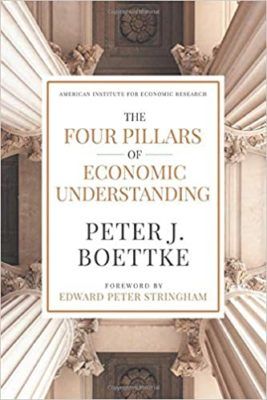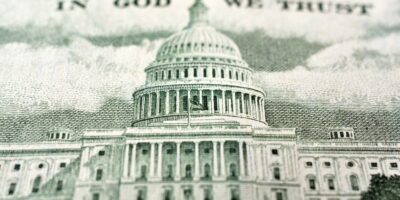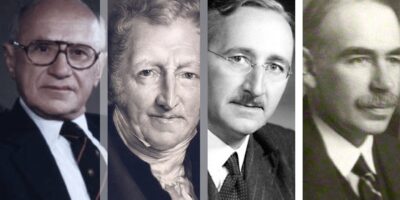The Four Pillars of Economic Understanding

It is no exaggeration to say that learning economics changed my life. In fact, I would go as far as saying the two most pivotal moments of my young adulthood was meeting my future wife at 17 and being exposed to economics at 19. Not only pivotal, but responsible for the good fortune and happiness I have had in the intervening years.
Earlier this month I turned 60. I became an economics major 40 years ago after the powerful messages I learned from my teacher Dr. Hans Sennholz and the economists and ideas he alerted me to. It was simply the way he taught that excited my imagination, and my journey since that time has only fueled my curiosity and imagination since.
I find everything about economics fascinating — its history, its sociology, its underlying philosophical debates, and most of all its ability in the hands of a real master to render the world in all its complexity intelligible. As James Buchanan taught us, economic theory is able to lift an ordinary individual to the heights of observational genius, while a genius unarmed with economic theory will often be reduced to very ordinary if not worse in their observations of how the world works.
Earlier this fall, I was part of a panel at the Southern Economic Association on Paul Rubin’s The Capitalism Paradox, along with Steve Horwitz and Sanford Ikeda. I have known of Ikeda since I was 19 because he was the star graduating economic student when I was first learning economics from Dr. Sennholz back at Grove City College. So, it was not surprising to me when Sandy in his comments summed up what he thought were the key ideas for teachers of economics to stress to excite the imaginations of subsequent generations of students. It was these ideas that changed my life.
Rubin’s book is highly recommended because he offers a useful corrective by stressing the importance of social cooperation among distant and disparate people, rather than the ruthless competitive nature of market society. Yes, market competition is unrelenting and valuable. But the by-product isn’t just the delivery of goods and services at least cost, but also the network of social relationships and bonds of cooperation that are formed even among strangers. Steve Horwitz recently gave a great talk on this in Greece, and was discussed at Coordination Problem. So our panel was united in its praise for Rubin’s work.
But, when Ikeda had his chance to summarize he placed the teaching of economics into 4 categories: Truth and Light; Beauty and Awe; Hope; and Compassion. My mind rushed back over the years to all the great teachers I have had in economics from Sennholz to Don Lavoie and Karen Vaughn, from Kenneth Boulding to James Buchanan and Gordon Tullock, and from colleagues such as Israel Kirzner and Mario Rizzo at NYU to Don Boudreaux, Tyler Cowen, Chris Coyne, Peter Leeson, Russ Roberts, Vernon Smith and Virgil Storr. They all hit these different categories in their teaching and writing with different levels of emphasis and all with great effect. A few hit all four constantly and they stand out above the crowd.
Truth and Light
Economics begins with the recognition of scarcity. There is certain shock value when you first are taught this idea and the notion that in our world we are constantly confronted with trade-offs, and as such notions of optimality are a function of the skill with which we as human decision-makers negotiate these trade-offs.
Learning economics to a considerable extent is learning about all the implications of scarcity, and thus the persistent and consistent application of opportunity cost reasoning to all human affairs. Tullock (along with Richard McKenzie) achieve this with their The New World of Economics, which was originally published during the 1970s and which I read as an undergraduate economics student at Grove City College.
Economics brings truth and the light to the darkness, and pierces through the fog to make sense of all human endeavors, whether in pursuit of the highest ideals or the basis of crass motives. If you are being taught economics by Gordon Tullock, or for that matter Pete Leeson (The Invisible Hook and more recently WTF), be prepared to be shocked out of your comfortable complacency and instead learn about the logic and underlying governing dynamics of the world around you.
Beauty and Awe
Adam Smith sought to excite the imagination of his readers of The Wealth of Nations with two striking examples early on in the first book. We are asked to contemplate our situation in the world. We depend for our very survival on the cooperation of a great multitude of individuals, yet in our lifetime we have the occasion to make only a few close friends. Smith informs us, therefore, that we cannot rely on their benevolence to help us in our daily struggle for existence. We must appeal to their own self-love. It is not, as he says, from the benevolence of the butcher, the baker and the brewer that we can procure our dinner, but with regard to their self-love.
Let that sink in; we require institutions that will enable us to engage in productive specialization, realize mutual gains from exchange, and achieve peaceful social cooperation among distant and disparate people. Smith hammers this point home with his example of the common woolen coat that exists on the back of the day laborer. He traces out the great multitude of individuals involved in this complex division of labor that must coordinate their activity with one another in order to produce even this simple product. Leonard Read and Milton Friedman would later use the story of a pencil to similar effect.
And how is that achieved? Friedrich Hayek’s great contribution was to show how the price system through the knowledge generating, utilization and communication functions can produce this complex web of interdependent relationships among economic actors near and far. Hayek even used the phrase “marvel” to shake his professional colleagues out of their complacency about the beauty and awe of the complex coordination of a free market economy.
The scientific imagination is piqued either through a sense of awe or a sense of urgency. Economics is capable of both, and we do a disservice to our students when we don’t expose them to both. My colleague Chris Coyne’s work in the field of post-war reconstruction (After War) as well as humanitarian aid (Doing Bad By Doing Good) demonstrates to his readers that getting the economics right is really a matter of life and death in the real-world. But this understanding of the urgency is based on a sense of awe at the power of the price system.
This is reflected in important ways in Russ Roberts’ trilogy, The Choice, The Invisible Heart and The Price of Everything. Recently I made a post about the beautiful patterns of nature and the analogy to the market that Alfred Marshall draws in his Principles of Economics, and I think watching the rhythmic movement of the pendulum and the pattern produced is helpful to economics students to think about the complex pattern of economic relationships formed through the guidance of the price system.
Prices guide us, profits lure us, and losses discipline us in our decisions, and property rights provide the institutional infrastructure required for all of this to take place. James Buchanan taught us that the number one job of the economics teacher was to develop an appreciation in their students of the spontaneous order of the market so that our students could become informed participants in the democratic process of collective decision-making. In developing that appreciation, it helps to teach them about the mystery of the mundane.
Hope
But, learning economics and economic history teaches us even more; it teaches us about the “Great Escape” as Angus Deaton has dubbed it, as through the expansion of trade, refinements in the division of labor, technological innovations, and adoption of rules of the economic game that cultivate these developments rather than hinder them, humanity was able to get beyond the Malthusian struggle and the oppression of crushing poverty. Economics teaches us hope in the betterment of the human condition.
Entrepreneurs in the private sector act on price signals to constantly seek out deals by buying low and selling high, and in doing so bring mutual gains from trade. But these entrepreneurs are also constantly on the lookout for cost saving technologies in production or improvements in the delivery mechanism to consumers of their goods and services. And, don’t ever forget the innovations they introduce and the discovery of new products and new services that better satisfy the demands of consumers. Hope in the form of improved living conditions is born out of individuals being able to bet on ideas and bring those bets to life.
Hope is also a function of finding changes in the rules that will ease the costs of transacting and encourage the discovery of new opportunities for mutual gains from trade. Thus, public entrepreneurs can, and have, made tremendous improvements in the lives of millions (billions) by introducing changes in policy and more importantly in the legal and political structure that unleashes the creative powers of a free civilization as Hayek talks about in The Constitution of Liberty.
In recent years, perhaps nobody has documented this message of hope from economics better than Deirdre McCloskey in her Bourgeois trilogy. These are advanced texts, but the basic message is accessible to everyone. And, I would argue that as economic teachers, it is imperative that you communicate. Tyler Cowen in his recent Arrow Lecture asks whether Economic Growth is a Moral Imperative; he answers in the affirmative. It would be valuable to have your students watch this discussion.
Compassion
And, finally, economic teaching should stress how economic progress doesn’t result in gains only for the wealthy, but lifts the least advantaged from their previous precarious situation through material betterment. As Milton Friedman used to say, all ships rise in a rising tide. But it goes deeper than this empirical observation.
Economics as a tool of social criticism — perhaps its second most important role — is a rational method for assessing alternative policies and even economic systems. The strict adherence to value freedom in the analysis means that the economist takes the ends of the advocate as given, and limits their critical analysis to the effectiveness of the chosen means by the advocate to the achievement of the stated ends of the advocate for the policy or system.
If the goal is to help the least advantaged get affordable housing, and the means chosen is rent control, then the economists examines the logic of choice, and the situational logic of that means/ends relationship. We study the structure of incentives and the flow of information embodied in those structures and the ability of the system to produce the desired results. This has been the economist’s way from the classical political economists to the modern textbook economics.
The much maligned Econ 101 is actually couched in these terms for anyone who wants to read closely, rather than assume that economists are engaged in normative theorizing parading as positive analysis.
The great economists from Adam Smith to Vernon Smith were all passionately concerned with the status of the least advantaged among us. Economics teaches with great compassion about the less fortunate, and focuses energy on the institutional remedies that will open up opportunities and eradicate barriers.
As Lionel Robbins persuasively argued to my mind in The Theory of Economic Policy, the great British Classical Political Economists developed their theories in a manner that co-evolved with the development of British institutions of liberalism — private property, freedom of contract, rule of law. What must not be forgotten in all of this is that these liberal political economists, again reflected strongly in Hayek’s The Constitution of Liberty as well as in various writings of James Buchanan, sought a system of government that exhibited neither discrimination nor domination. It is a system designed to eliminate privileges, and to recognize the rights of all as dignified equals before the law.
I honestly think that this message of economics — truth and light; beauty and awe; hope; and compassion — can excite the imagination of every generation to explore the intricacies of economic theory, and study in detail both the history of this fascinating discipline and the practical history of economies throughout the world.
We have to bring our students the truth and the light, but we also must instill in them a sense of beauty and awe at the complex coordination of the market, communicate the message of hope in our quest to improve the human condition, and speak to concerns and express our compassion for the least advantaged in our common cause of living in a society that grants freedom and dignity to all. As my colleague Virgil Storr (and Ginny Choi) establish in their recent book, Does the Market Corrupt Our Morals?, the answer is NO, it doesn’t. In fact, commercial society provides the foundation for our moral learning and improvement in our social relationships with one another.
With the increasing attacks on Econ 101, it is time for a renewed commitment by teachers to communicating to this generation the best of what is to be learned from economics.











